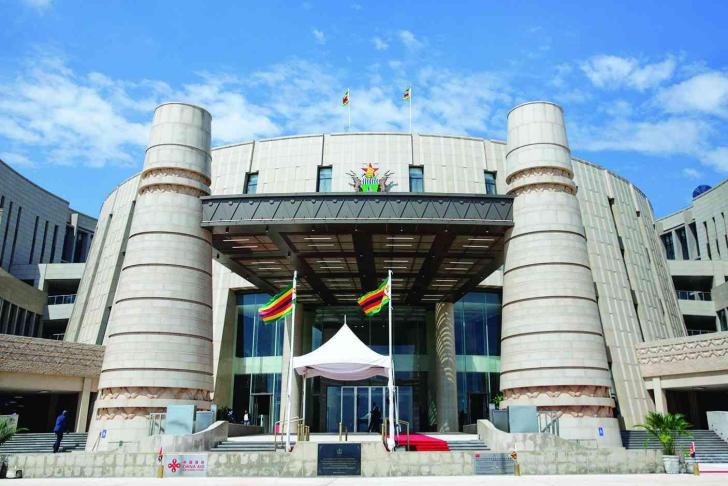News / National
Zimbabwe parliament fuel allocations under spotlight
10 Aug 2025 at 09:09hrs |
0 Views

A recent
audit report by the Auditor General (AG) has exposed troubling
irregularities within Parliament's administration, revealing that senior
staff may have been allocating themselves over 1,000 litres of fuel
each without proper authorization. The findings, contained in the AG's
report for the year ended December 2024, point to significant financial
mismanagement and systemic weaknesses in Parliament's accounting
controls.
Acting Auditor General Rheah Kujinga highlighted that senior staff in the office of Speaker of Parliament, Jacob Mudenda, were regularly dispensing fuel far beyond authorized limits. The report states that allocations ranged from 460 litres to as much as 1,440 litres per month, amounting to a 32% increase above the officially sanctioned quantities.
"The fuel allocation was 32% above the authorized quantity. Treasury concurrence or resolution from the Committee of Standing Rules and Orders (CSRO) for the differential allocation of fuel to management and staff over and above the authorized limit was not availed," the report reads. The AG urged Parliament management to provide documentation proving Treasury approval or CSRO resolutions for these increases.
Parliament management defended the allocations, citing section 117 of the Constitution which empowers the CSRO to set terms for Parliament staff. They claimed that additional fuel allowances were approved to accommodate increased travel mileage related to the new Parliament building.
However, the report also revealed serious shortcomings in Parliament's financial management systems beyond fuel misallocation. It noted the absence of proper creditor ledgers and disclosed that payment arrears totaling approximately ZWL$211.9 million - some dating back to 2022 - could not be fully verified.
"I could not verify the accuracy of the balance of ZWL$211,920,773 appearing on the statement of payment arrears return submitted for audit," the report stated, warning that Parliament risks legal action or penalties for late payments under the Public Finance Management Act.
The audit further uncovered that concessional loans amounting to over ZWL$2 billion lacked proper repayment schedules. Loan agreements were incomplete, with repayment periods and instalment plans left blank, raising concerns about potential revenue losses to the government.
The Parliament's asset management was also called into question. The AG's report found that several vehicles procured at a cost of hundreds of thousands of dollars had not been delivered despite full payments to suppliers. Specifically, three Toyota Hilux double cabs purchased in March 2023 for US$193,443 and a 60-seater bus along with two 30-seater buses bought in March 2022 for ZWL$71 million were undelivered as of May 2024.
"There was no evidence of timely follow-ups with suppliers by relevant officials," the report noted, suggesting negligence in asset tracking and contract enforcement.
The revelations paint a picture of a Parliament grappling with internal governance challenges, financial opacity, and lapses in accountability. The report's findings raise questions about stewardship of public resources at the highest levels of legislative administration and call for urgent remedial action to restore public trust.
Acting Auditor General Rheah Kujinga highlighted that senior staff in the office of Speaker of Parliament, Jacob Mudenda, were regularly dispensing fuel far beyond authorized limits. The report states that allocations ranged from 460 litres to as much as 1,440 litres per month, amounting to a 32% increase above the officially sanctioned quantities.
"The fuel allocation was 32% above the authorized quantity. Treasury concurrence or resolution from the Committee of Standing Rules and Orders (CSRO) for the differential allocation of fuel to management and staff over and above the authorized limit was not availed," the report reads. The AG urged Parliament management to provide documentation proving Treasury approval or CSRO resolutions for these increases.
Parliament management defended the allocations, citing section 117 of the Constitution which empowers the CSRO to set terms for Parliament staff. They claimed that additional fuel allowances were approved to accommodate increased travel mileage related to the new Parliament building.
However, the report also revealed serious shortcomings in Parliament's financial management systems beyond fuel misallocation. It noted the absence of proper creditor ledgers and disclosed that payment arrears totaling approximately ZWL$211.9 million - some dating back to 2022 - could not be fully verified.
"I could not verify the accuracy of the balance of ZWL$211,920,773 appearing on the statement of payment arrears return submitted for audit," the report stated, warning that Parliament risks legal action or penalties for late payments under the Public Finance Management Act.
The audit further uncovered that concessional loans amounting to over ZWL$2 billion lacked proper repayment schedules. Loan agreements were incomplete, with repayment periods and instalment plans left blank, raising concerns about potential revenue losses to the government.
The Parliament's asset management was also called into question. The AG's report found that several vehicles procured at a cost of hundreds of thousands of dollars had not been delivered despite full payments to suppliers. Specifically, three Toyota Hilux double cabs purchased in March 2023 for US$193,443 and a 60-seater bus along with two 30-seater buses bought in March 2022 for ZWL$71 million were undelivered as of May 2024.
"There was no evidence of timely follow-ups with suppliers by relevant officials," the report noted, suggesting negligence in asset tracking and contract enforcement.
The revelations paint a picture of a Parliament grappling with internal governance challenges, financial opacity, and lapses in accountability. The report's findings raise questions about stewardship of public resources at the highest levels of legislative administration and call for urgent remedial action to restore public trust.
Source - The Standard
Join the discussion
Loading comments…



























